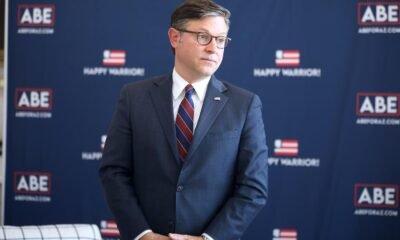Business
GOP Senate Hopeful Mark Finchem Joins Talk Show of Controversial Antisemitic Host

On the 23rd anniversary of the September 11 attacks, former Arizona lawmaker Mark Finchem appeared on a talk show hosted by conspiracy theorist Scott McKay, where he propagated various theories himself. McKay, who has previously made antisemitic claims about the 9/11 attacks, has been reported for his extremist views.
Finchem, a Republican candidate anticipated to return to the Arizona Legislature in January, has garnered attention for his controversial positions on election fraud and affiliations with extremist groups, including the Oathkeepers. During his appearance on McKay’s program streamed on Rumble, he endorsed a so-called investigation led by a non-profit organization focused on a contentious case involving the Millersville Police Department in Tennessee.
This organization gained notoriety as the Tennessee Bureau of Investigation recently executed a raid on the Millersville Police Department in connection with allegations against assistant police chief Shawn Taylor, who had also featured on McKay’s show. Questions arose regarding Taylor’s potential misuse of sensitive law enforcement data related to personal political agendas.
Media Matters for America senior investigative reporter Eric Hananoki criticized Finchem for engaging with McKay, reminding that the host has praised Adolf Hitler and espoused dangerous conspiracy theories. Such associations raise alarms about the ideological implications for Finchem’s candidacy.
Throughout the interview, both men engaged in discussions hinting at widely debunked conspiracy theories, including references to QAnon, which alleges a vast cabal of pedophiles controls global politics. McKay made sweeping claims regarding the CIA and FBI’s involvement in nefarious activities, while Finchem further propelled these narratives without substantiated evidence.
Additionally, Finchem accused individuals involved in the investigation of being corrupt and suggested a cover-up by local journalists connected to the case. He also alleged that critical figures in the Tennessee case were linked to child sex trafficking, in a continuation of his conspiratorial rhetoric.
The Jewish Community Relations Council of Greater Phoenix expressed deep concern regarding Finchem’s participation in McKay’s show, condemning the platforming of harmful ideologies. Board chair Alan Zeichick urged voters to reject candidates fostering division through association with extremist figures.
In light of the interview and Finchem’s historical patterns of aligning with fringe elements, Hananoki noted that it would have been prudent for Finchem to research McKay’s background before accepting such an invitation. This incident raises critical questions about the candidate’s judgment and potential impact on Arizona’s political landscape.

















